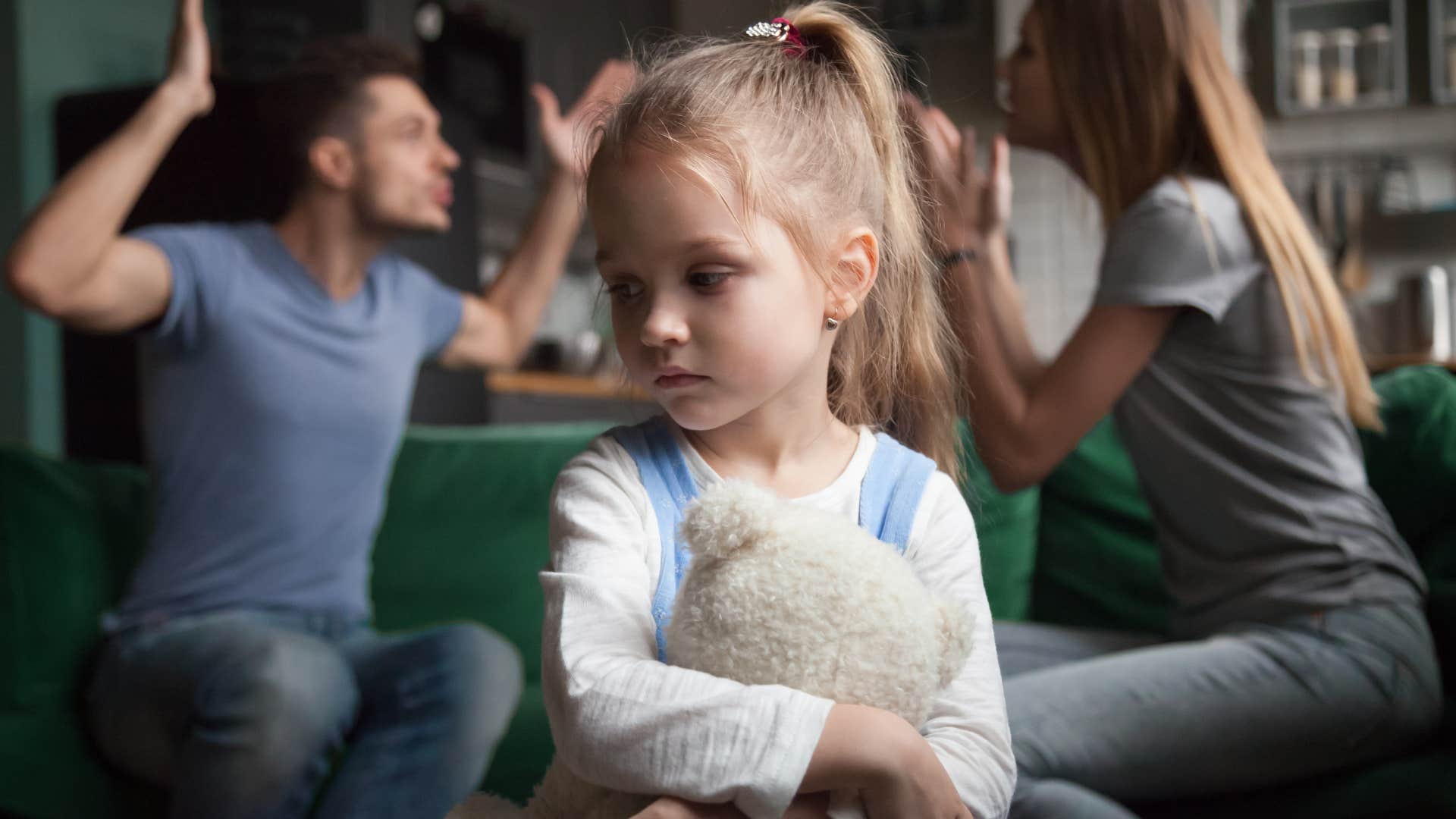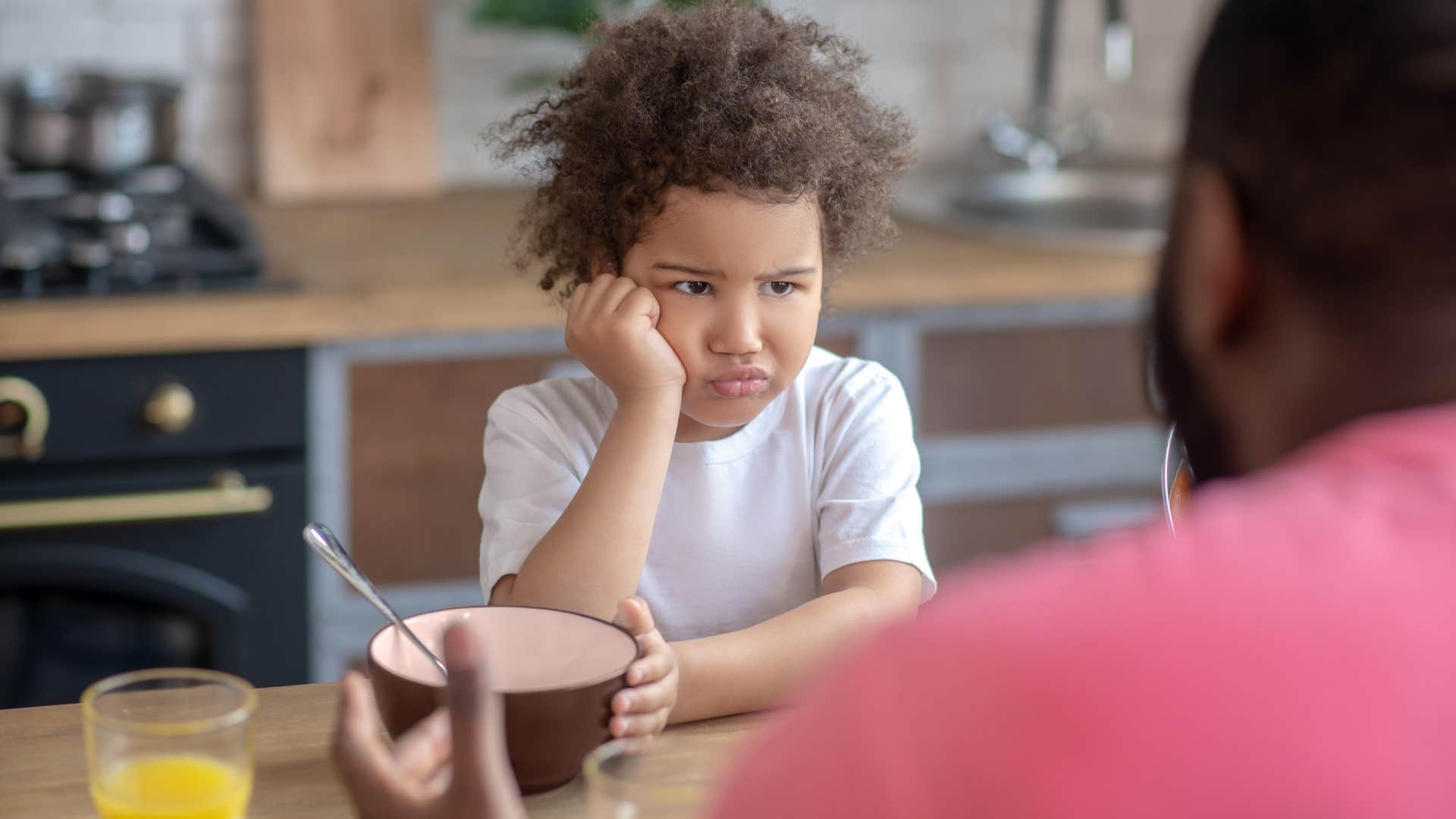11 Things Millennials Secretly Blame Their Parents For, Even If They'd Never Say It Out Loud
They're carrying resentment in their own lives from decades ago
 Perfect Wave | Shutterstock
Perfect Wave | Shutterstock For many millennials who have settled into their adult life, it's impossible to ignore the childhood experiences and traumas they're still coping with in their relationships and personal routines today. Like a study from BMC Public Health suggests, our childhood is the foundation for our adult lives. Whether it's the routines we cultivated with parents, the behaviors we were taught, or the relationships that served as role models for us, everything is influential.
Many of the things millennials secretly blame their parents for, even if they'd never say it out loud, have continued to pop up in their lives time and time again. While they may not be brought up in conversations or resolved with their parents, they still fuel resentment and tension in their family relationships and impact their personal lives, in general.
Here are 11 things millennials secretly blame their parents for, even if they'd never say it out loud
1. Downplaying mental health
 pikselstock | Shutterstock
pikselstock | Shutterstock
According to a 2022 study, millennials who grew up talking and hearing about anxiety, depression, and mental health are not only more comfortable expressing their own thoughts in adulthood, they're more likely to seek support and help when they're struggling. Of course, for this generation, who were exposed to the internet and certain resources online later in their adolescent years, it really starts with their parents.
Not having these conversations at home or feeling like their mental health struggles were something to suppress are a couple of the things millennials secretly blame their parents for, even if they'd never say it out loud.
They're not only trying to unlearn their guilt around asking for help, shame around resources like therapy, and comfort speaking vulnerably in their own lives now, they're battling resentment toward their parents for instilling this mindset within them.
2. Avoiding accountability
 fizkes | Shutterstock
fizkes | Shutterstock
Children who grew up in homes where parents had open conversations, addressed conflict, rather than letting it go unresolved, and expressed emotions thoughtfully often have healthier relationships in adulthood than their peers.
They were equipped with a comfortability expressing emotions and communicating openly without guilt or shame, while others — who had parents who avoided accountability and blame-shifted — tended to struggle.
Millennials often secretly blame their parents for making them poor communicators and never giving them the opportunity to learn how to embrace discomfort, have open conversations, and resolve conflict head-on. While it might seem like "the norm" growing up, it holds a lot of power in sabotaging relationships and healthy connections later on in life.
3. Comparing them to other people's kids
 DimaBerlin | Shutterstock
DimaBerlin | Shutterstock
Comparison culture affects us all in a variety of ways, whether it's childhood scrolling on social media, comparing our own kids to other families, or even pressuring ourselves with unrealistic expectations at work. When our parents compare us to other people, urging us to get a different job, make more money, or settle down in a relationship, it can spark a lot of resentment that many millennial adult children still grapple with.
Not only does it make them feel less heard and valued by their parents, but they adopt feelings of guilt, self-doubt, and insecurity about their lives in ways that are almost always completely unnecessary.
4. Never talking about money
 Zivica Kerkez | Shutterstock
Zivica Kerkez | Shutterstock
According to a report from the TIAA Institute, millennials are one of the less financially literate generations compared to the general public, largely because they missed out on opportunities to learn healthy money habits and mindsets early in life. Despite being raised in a somewhat protective space at home, their parents rarely spoke about money, unintentionally ensuring it was painted as a shameful or secretive topic.
In adulthood, millennials may resent their parents for this mindset, unlearning the internalized shame and embarrassment they harbor around money and speaking about their financial situation.
5. Romanticizing burnout
 Dejan Dundjerski | Shutterstock
Dejan Dundjerski | Shutterstock
For their parents who were inaugurating into a similar "hustle culture" as boomers and digested toxic ideas about work-life balance and company loyalty, it's not surprising that romanticizing burnout is one of the things millennials secretly blame their parents for, even if they'd never say it out loud.
Not only does it pressure them to work longer unsustainable hours, it inadvertently makes them feel guilty for resting and taking time away from their corporate work lives. They struggle with finding a balance between personal time and professional success, because their parents pressured them to not only always be productive, but to sometimes center their entire lives around their professional careers.
6. Staying in toxic relationships
 fizkes | Shutterstock
fizkes | Shutterstock
Many parents make the difficult decision to stay in their unhealthy marriages or relationships for the "sake of their kids," but in reality, they're not doing their children any favors by staying in a relationship that's not meant for them. Outside of teaching their kids that it's okay to tolerate poor behavior from a partner, the tension, resentment, lack of affection, and conflict that erupts at home as a result of staying together can sabotage their relationships later in life.
Many millennials secretly blame their parents for staying together when they should've separated, because they never had a role model of a healthy relationship to teach them vulnerability, healthy habits, or truly unconditional love.
While they certainly play a strong role in influencing their own connections for the better and worse, their parents' choices and relationships also hold a lot of power in affecting how healthy their connections are in adulthood.
7. Dismissing their emotions
 fizkes | Shutterstock
fizkes | Shutterstock
According to licensed marriage and family therapist Jennifer Litner, having an emotionally unavailable parent growing up can spark a lot of people-pleasing behaviors later in life. As a kid, many millennials felt pressured to beg for attention or plead for an ounce of emotional support when they really needed it, so it's not surprising they secretly blame their parents for struggling with emotional intelligence now.
Having open conversations is key to fostering a healthy dynamic at home, but when parents don't open themselves up to vulnerability or act as a healthy role model for their kids to practice, it affects generations of people and kids from forming the healthiest relationships possible.
8. Cultivating a toxic relationship around food
 Dmytro Zinkevych | Shutterstock
Dmytro Zinkevych | Shutterstock
Many adults still struggle with toxic relationships surrounding food and their own body image as a result of their upbringing. Especially if they grew up in a household centered around diet culture and comparison, it's common for kids to adopt and mirror the behaviors and mentalities of their parents — even at the expense of their own health, well-being, and self-esteem.
Especially for millennial women, who tend to absorb their mother's mentalities and habits around food more than others, unlearning toxic ideas about their own body image can be a struggle in adulthood. While it might be a struggle both generations are grappling with in the same family, it's still one of the things millennials secretly blame their parents for, even if they'd never say it out loud.
9. Living through their kids
 Chay_Tee | Shutterstock
Chay_Tee | Shutterstock
Many parents who struggle with the process of aging and their own self-esteem live vicariously through their kids throughout their lives for a sense of control and security. Whether that's pushing their career aspirations onto their adult kids or blaming them for not following a specific kind of self-expression or identity, it's one of the things millennials secretly blame their parents for, even if they'd never say it out loud.
Not only does this spark a lot of internalized shame and guilt in kids for pursuing their own interests and passions, it drives a wedge between parents and their children later in life.
10. Guilt-tripping
 Prostock-studio | Shutterstock
Prostock-studio | Shutterstock
According to licensed psychologist Lynn Margolies, parents who guilt-trip their kids are often fueled by their own insecurities and lack of self-awareness. They cope with the discomfort they're constantly battling internally by shifting that emotional burden to their kids — playing the victim, even at the expense of their well-being.
Even using phrases like "Why don't you just get another parent?" or "after everything we've done for you" can spark tension between children and their parents, especially later in adulthood when these same children struggle with people-pleasing mentalities as a result of their parents' behavior.
11. Prioritizing money over happiness
 pixelheadphoto digitalskillet | Shutterstock
pixelheadphoto digitalskillet | Shutterstock
When parents prioritize money over happiness in their own lives, children living in their households tend to adopt that same mentality, sabotaging their ability to find joy, fulfillment, and stability in their own routines later in life.
Whether it's overlooking a passion for the sake of a high-paying job or adopting a "sacrifice mentality" around saving money, it's one of the things millennials secretly blame their parents for, even if they'd never say it out loud.
Zayda Slabbekoorn is a staff writer with a bachelor's degree in social relations & policy and gender studies who focuses on psychology, relationships, self-help, and human interest stories.

